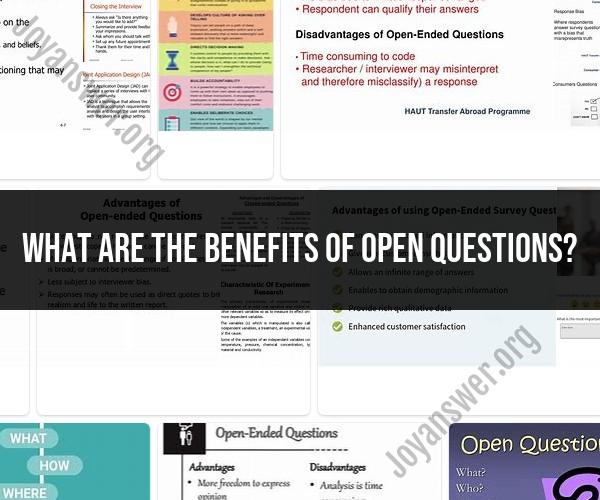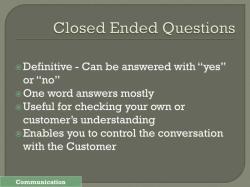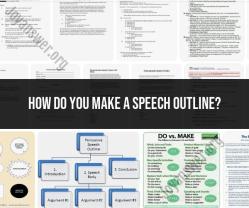What are the benefits of open questions?
Using open questions in communication offers several advantages, making it an effective technique in various settings, including interviews, conversations, therapy sessions, and problem-solving discussions. Here are some of the key benefits of using open questions:
Encourages Engagement: Open questions invite the other person to actively participate in the conversation. They encourage individuals to express their thoughts, feelings, and ideas, fostering engagement and interaction.
Promotes Critical Thinking: When faced with an open question, individuals are prompted to think more deeply and critically about their responses. This can lead to more insightful and thoughtful answers.
Facilitates Exploration: Open questions are valuable for exploring a topic or issue in greater detail. They allow the conversation to delve into specific aspects, uncovering information and insights that closed questions might miss.
Gathers Comprehensive Information: Open questions often yield more comprehensive and detailed information compared to closed questions. They can provide a more complete picture of the person's perspective or the topic under discussion.
Builds Rapport: By showing genuine interest in the other person's thoughts and opinions, open questions can help build rapport and strengthen interpersonal relationships. They convey a sense of respect and attentiveness.
Enhances Active Listening: Open questions require active listening on the part of the questioner. This active listening can lead to better understanding of the other person's point of view and foster empathy.
Supports Problem Solving: In problem-solving scenarios, open questions can help identify root causes, explore potential solutions, and gather input from multiple stakeholders, facilitating a more effective problem-solving process.
Encourages Self-Reflection: When individuals are asked open questions about their own experiences or decisions, it can encourage self-reflection and self-awareness, leading to personal growth and development.
Adaptable to Different Contexts: Open questions are versatile and can be used in various contexts, from job interviews to therapy sessions to everyday conversations. They are adaptable to the situation and goals of the communication.
Expands Possibilities: Open questions can expand the range of possibilities and ideas in a discussion. They don't limit responses to predefined options, allowing for creativity and exploration of new concepts.
Supports Conflict Resolution: In conflict resolution, open questions can help uncover underlying issues and feelings, providing a more comprehensive understanding of the conflict and potential solutions.
Promotes Inclusivity: Open questions can encourage contributions from all participants in a conversation, ensuring that diverse perspectives are heard and valued.
While open questions offer many advantages, it's essential to use them judiciously and consider the context and the goals of the communication. Depending on the situation, a mix of open and closed questions may be the most effective approach to facilitate meaningful and productive conversations.












